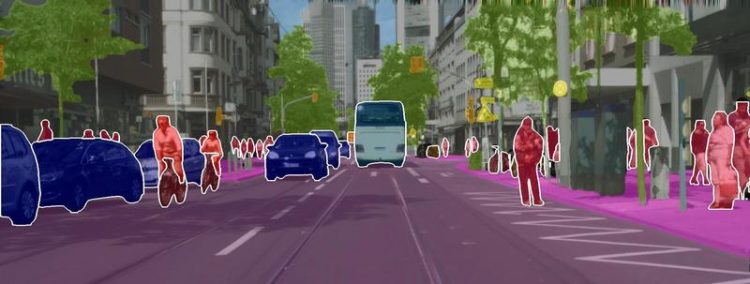New deep learning research breaks records in image recognition ability of self-driving cars

Red for people, blue for cars: A new method uses artificial intelligence (AI) model that enables coherent recognition of visual scenes more quickly and effectively. Source: Abhinav Valada
At the Department of Computer Science at the University of Freiburg Dr. Abhinav Valada, Assistant Professor for Robot Learning and member of BrainLinks-BrainTools focuses on this research question.
Valada and his team have developed the state-of-the-art “EfficientPS” artificial intelligence (AI) model that enables coherent recognition of visual scenes more quickly and effectively.
This task is mostly tackled using a machine learning technique known as deep learning where artificial neural networks that are inspired from the human brain, learn from large amounts of data, explains the Freiburg researcher. Public benchmarks such as Cityscapes play an important role in measuring the advancement in these techniques.
“For many years, research teams, for example from Google or Uber, compete for the top place in these benchmarks”, says Rohit Mohan, a member of Valada’s team. The method of the computer scientists from Freiburg, which has been developed to understand urban city scenes, has been ranked first in Cityscapes, the most influential leaderboard for scene understanding research in autonomous driving.
EfficientPS also consistently sets the new state-of-the-art on other standard benchmark datasets such as KITTI, Mapillary Vistas, and IDD.
On the project website, Valada shows examples of how the team trained different AI models on various datasets. The results are superimposed on the respective input image, where the colors show which object class that the model assigns the pixel to.
For example, cars are marked in blue, people in red, trees in green, and buildings in gray. In addition, the AI model also draws a border around each object that it considers a separate entity. The Freiburg researchers have succeeded in training the model to transfer the learned information of urban scenes from Stuttgart to New York City.
Although the AI model did not know what a city in the USA could look like, it was able to accurately recognize scenes of New York City.
Most previous methods that address this problem have large model sizes and are computationally expensive for use in real-world applications such as robotics that are highly resource constrained, explains Valada:
“Our EfficientPS not only achieves state-of-the-art performance, it is also the most computationally efficient and fastest method. This further extends the applications in which EfficientPS can be used.”
Demo of AI Models
http://panoptic.cs.uni-freiburg.de/
Sample video: Driving in New York City
https://www.youtube.com/watch?v=FcUEj9N1fVc&feature=youtu.be
“Cityscapes” Benchmark Leaderboard
https://www.cityscapes-dataset.com/benchmarks/#panoptic-results
Contact:
Dr. Abhinav Valada
Assistant Professor for Robot Learning
University of Freiburg
Tel.: 0761/203-8025
E-Mail: valada@cs.uni-freiburg.de
https://www.pr.uni-freiburg.de/pm-en/press-releases-2020/faster-and-more-effecti…
Media Contact
All latest news from the category: Information Technology
Here you can find a summary of innovations in the fields of information and data processing and up-to-date developments on IT equipment and hardware.
This area covers topics such as IT services, IT architectures, IT management and telecommunications.
Newest articles

How marine worms regenerate lost body parts
The return of cells to a stem cell-like state as the key to regeneration. Many living organisms are able to regenerate damaged or lost tissue, but why some are particularly…

Nano-scale molecular detective
New on-chip device uses exotic light rays in 2D material to detect molecules. Researchers have developed a highly sensitive detector for identifying molecules via their infrared vibrational “fingerprint”. Published in Nature…

Novel CAR T-cell therapy
… demonstrates efficacy and safety in preclinical models of HER2-positive solid tumors. The p95HER2 protein is found expressed in one third of HER2+ tumors, which represent 4% of all tumors….



